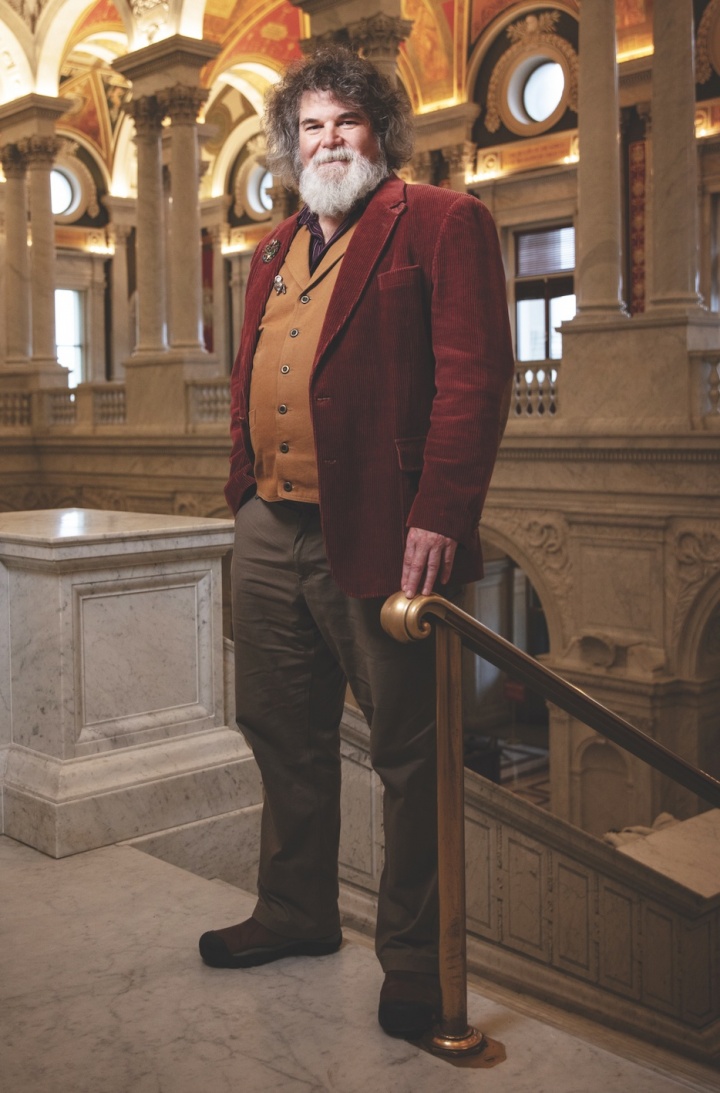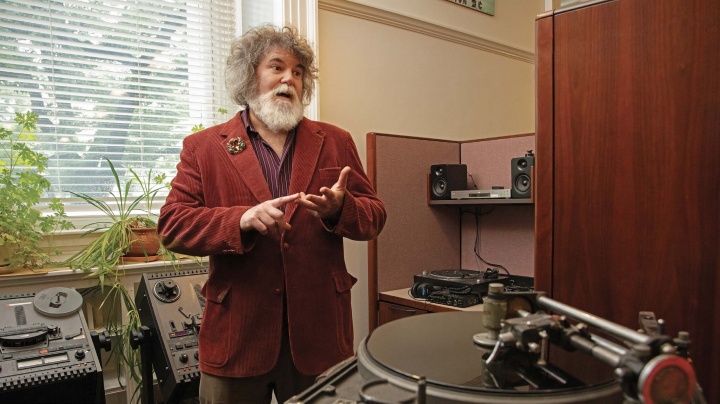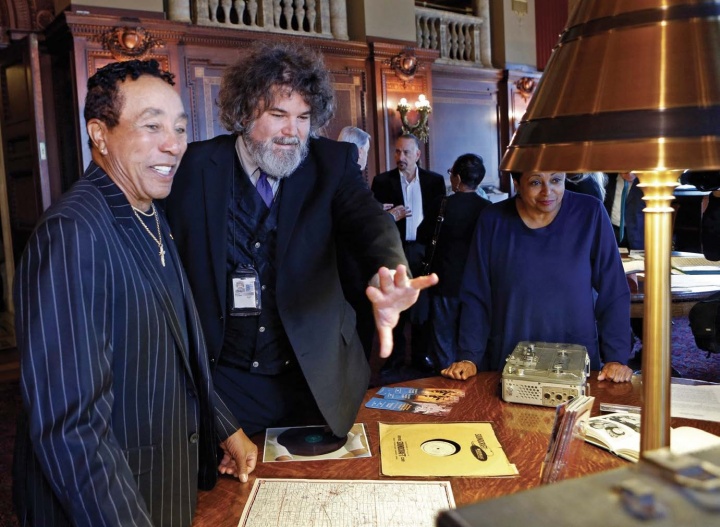The Library of Congress’ Stephen Winick ’90 works to preserve cultural traditions.
Columbia College | Columbia University in the City of New York
The Library of Congress’ Stephen Winick ’90 works to preserve cultural traditions.

Winick in the Great Hall of the Library of Congress
JÖRG MEYER
Winick is a longtime folklorist with the library’s American Folklife Center, which maintains one of the world’s largest archives of folklife materials — an array that encompasses the customs, traditions, knowledge, stories, arts and other information that’s been passed down from generation to generation. AFC’s holdings include recordings of music from around the world; firsthand accounts by formerly enslaved people; documentation of the lives of cowboys, farmers and fishermen; early Native American songs and legends; photographs of crafts; regional recipes; and much, much more.
Folklife, Winick says, is essential to understanding everyday human experience. “It’s a form of social history, a form of oral history — a form of understanding who we are as a people, and understanding who each people is as a people.”
As an expert in folk music, in particular ballads and sea chanteys, Winick often focuses on song. A highlight of his tenure was uncovering the oldest known recording of “Kumbaya,” from 1926. But his purview is hardly confined to historic material and memory; folklife is about living cultural traditions. Winick has worked on projects with Natalie Merchant, Billy Bragg, Rosanne Cash, Sheryl Crow and others. He also helps to produce the AFC’s annual Archive Challenge, where musicians select a song from the archive and reinterpret it for today.
Winick himself looks the part of someone who spends his days steeped in lore. Partly it’s his resemblance to Harry Potter’s Hagrid: the height, the bushy beard, the halo of frenzied hair. (He delights in the comparison, one he gets often.) His clothing that May day further suggests he’s walked in from a hidden door to a fantasy realm: a plum button-down shirt, mustard vest and maroon corduroy jacket. The vest and jacket are each affixed with a silver pin — one an owl, the other a stag’s head wreathed with branches and birds.
Among other things, folklorists aim to discover origin stories. Was that knock-knock joke in Macbeth really the first ever written? (No; Winick found one penned more than a decade before Shakespeare.) In describing his research, it becomes clear that Winick’s mind is always turning — noticing details and incongruities, asking questions, comparing evidence. “We’re interested in the roots of things, the older roots of modern culture — and so we’re always looking back,” he says.
The roots of Winick’s own interests date back to the College. His choice of schools felt like a given; he’d grown up on the Upper West Side and his father, Dr. Myron Winick ’51, was a professor at the medical school. Winick’s focus was Middle English, “all those Medieval stories that were clearly passed down by word of mouth before they were written down.” (His senior thesis was on Sir Gawain and the Green Knight.)
“We’re interested in the roots of things, the older roots of modern culture — and so we’re always looking back.”
He also joined WKCR, where he started a Celtic music show, “listening very closely to these old songs and ballads and realizing they were not unrelated to the Medieval romances I was studying.” His personal music tastes leaned toward bands like 10,000 Maniacs and The Pogues, who mixed folk into their sound. He began writing freelance articles for Dirty Linen, a folk and world music magazine.
As he neared graduation, Winick wanted to dive deeper into folklore — a pull that led to applying for his master’s. He ultimately earned a Ph.D. at Penn in 1998. His dissertation was on the use of proverbs in American popular culture, but Winick otherwise remained immersed in musical subjects. He continued working with Dirty Linen, logging almost 25 years as a contributing editor, and in the early aughts ran the Delaware Valley Folklife Center in New Jersey.
In February, Winick marked two decades with the Library of Congress, which only seems like a lot, he says, until you compare it with other staffers. “People work here a long time. I know a few who’ve worked here for more than 50 years, so 20 isn’t that much. It’s like dog years,” he jokes.

Winick explains the mechanics of capturing audio; a Presto instantaneous disc recorder (shown in the foreground) made thousands of the American Folklife Center’s iconic recordings from the early 1930s to the early 1950s.
JÖRG MEYER
The key turned out to be the song’s name, which was originally “Come By Here.” “Kumbaya” is a phonetic rendering that stems from the Gullah Geechee people, descendants of slaves who live in the coastal regions of the American Southeast. Winick realized that he needed to look in the card catalog under the older title. Five songs were filed under the phrase, and only one was still playable: a recording from 1926, sung by H. Wylie, a Gullah Geechee man.
The discovery was significant on multiple levels. It corrected the record on authorship, as until then the prevailing narrative was that a white evangelist, the Rev. Marvin V. Frey, had written the song in 1936.
The 1926 recording also helped clarify the song’s intent. Winick notes that “Kumbaya” has gotten a bad rap in recent decades, becoming a punchline for making a superficial connection, or connoting a touchy-feely, too-earnest yearning for peace and harmony. “But the song really has nothing to do with that, and it doesn’t sound like that,” Winick says. He thumps his palm on the table as he sings a verse in its original, syncopated rhythm.
“It basically says that someone is in trouble, someone is injured, someone is hurt; Lord, come by here. It’s asking God to come and help them with whatever predicament they’re in. It’s actually a beautiful sentiment.”
Winick’s job has evolved through the years, but it has always been wide ranging. Beyond his musical responsibilities, he writes for the Folklife Today blog, which he founded in 2013; he is also a co-host of the blog’s podcast. Both suit his inquisitive nature and give him license to explore just about any topic in the AFC. In one memorable instance, his research unearthed the story of Becky Elzy and Alberta Bradford, two women who were born into slavery in Louisiana and later emancipated, and who sang a series of spirituals for the library’s field recording team in 1934. Especially moving, says Winick, was his discovery that their recording of “Free at Last” was made on Juneteenth.
What’s more, through the blog post, Elzy’s and Bradford’s descendants were able to hear their ancestors’ voices for the first time. “There are endless stories like that in the archive,” Winick says. “I’ll never be able to discover them all, but I’m trying.”

Singer-songwriter Smokey Robinson was honored with the Library of Congress’ Gershwin Prize for Popular Song in 2016; Winick shared audio recordings from the American Folklife Center with Robinson during a tour of the library.
SHAWN MILLER / LIBRARY OF CONGRESS
“My job is what I would want to do in my spare time,” Winick says. “But it became my job — I’m very lucky.”
The statement is not hyperbole; Winick’s personal and professional lives are closely braided. A musician in his own right, he has sung with the Ocean Celtic Quartet for almost 20 years (the quartet’s founder is an AFC colleague). He is also finishing his first solo album, a collection of ballads about Robin Hood, that gallant thief of English folklore. The project is the culmination of years of research, with Winick reinventing the ballads through new combinations of traditional lyrics and music.
Winick’s musicianship is on display that same May afternoon as he delivers one of his informational presentations. The audience is a group of about 10 musicians from Azerbaijan, a small Turkic country between Russia and Iran. After sampling recordings from the AFC’s collection (W.H. Stepp fiddling his lively “Bonaparte’s Retreat”; Muddy Waters crooning “Ramblin’ Kid Blues”), he surprises them with several Azerbaijani recordings, captured for the archive in 1964. The group’s initial claps and exclamations give way to silence as they listen; the song is in the ashug tradition — a lute accompanied by a singer, his voice a high and sweet minstrel’s wail.
Afterward, the musicians make an impromptu circle with their folding chairs, asking Winick to join them. Two of them sing. Winick offers one of his Robin Hood ballads in return. A sense of warmth is palpable.
Winick shares afterward that he makes it a habit to tailor his presentations. “That’s one of the things we can always give people,” he says. “That their tradition is just as important as any other that we document.”

Published three times a year by Columbia College for alumni, students, faculty, parents and friends.
Columbia Alumni Center
622 W. 113th St., MC 4530, 6th Fl.
New York, NY 10025
212-851-7852
cct@columbia.edu

Columbia Alumni Center
622 W. 113th St., MC 4530, 4th Fl.
New York, NY 10025
212-851-7488
ccalumni@columbia.edu